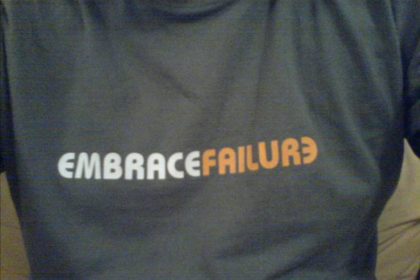
Progress can only be made through unanswered questions. One can’t find success by doing the same thing everyone else does, or making the mistakes others have answered. In starting with unanswered questions, you must agree that some, perhaps many, of your hypothesis, will prove wrong. You will fail, you might succeed.
The alternative is that you only start with answers, what you know, certainty, and what works. If you start by ensuring success, you’re not doing anything different/better than what anyone else has already done.
In the latter case, not only is it impossible to break new ground, everyone else has the same answers; you aren’t creating anything anew, you’re simply running something which has many competitors, stumbling along the way through challenges that others have already overcome.
So what is the simple most important trait of a successful entrepreneur? An embrace of failure that is greater than that of success.
You must be comfortable with failure: expect it. Demand it, or you aren’t trying hard enough.
“Fear is something everyone must learn to cope with when tackling life’s challenges, but this is especially important for entrepreneurs,” believes Richard Branson, whom I’m just going to presume you know, “who are likely to face many hard choices in the process of getting a business off the ground. And in the early stages of running a new enterprise, the way you handle pressure can often make the difference in whether it survives.”
Don’t misunderstand that as saying you don’t embrace success, that you don’t demand and expect success, of course you do. But the distinction of the successful entrepreneur is that one embrace failure; everyone demands success.
Failure vs. Mistakes
Failure is, most certainly, different from mistakes.
Surround yourself with experience and the right team. Don’t try to figure it all out yourself as mistakes, mistakes that were once someone else’s failures, already have answers. If you are making mistakes, that’s not the same as discovering new things that don’t work because you are demanding better by questioning first, and failing along the way.
There is a wonderful bit of conventional wisdom: there are two skills, two people perhaps, who will determine the success or failure of your business – the marketer who will insure that the firm has cash flow and the accountant, who will insure that taxes are paid and that the cash flow will be reinvested to finance growth.
On the surface of that wisdom, it’s easy to conclude that that’s because most people don’t fully understand the art and science of marketing nor the detail and precision of accounting, but I don’t think that’s what it’s saying. Rather, it reflects the psyche of those very individuals, the marketer who excels through experience but embraces failure to test, learn, and optimize, and the accountant who embraces failure by recognizing the diligence required in providing that “insurance.”
How to get learn to embrace failure? I love how Will Yakowicz put it in a piece for Inc, “In a very broad sense, you’re failing. No matter what you achieve in life and business, you’ll always fail.” Very zen no? It’s true.


Hey Paul,
Just want to take a moment to acknowledge your article. I really enjoyed the reminder of the positive role failure can play in our lives. I believe there is no avoiding series of failures on the path to achieve one’s goal. If you’re not failing at somethings you’re not stepping far enough outside of your box.
Glad to see you’re doing great. I think of you every time a see a Lego kit 🙂
Hi Paul,
Really enjoyed this article and many others on your site! What a great resource for sound advice and guidance on the traits of the entrepreneurial spirit and the naked truth behind what really goes into a start-up. Very happy to have stumbled upon your site!
Jerod
[…] Embrace failure more than success. Reward it. Celebrate success, but learn from failures. An advisor that’s only ever succeeded can only tell you what they did; they can’t help you avoid mistakes. Early customers are not a sign of traction, it’s a sign that you’ve found one potential market. Failure is evidence of where not to invest your time and resources, and as a result, a truer appreciation in the value of your business. […]
F3 = Fail Forward Faster!
[…] for real-world feedback. In contrast, ecosystems that celebrate iterative development and embrace failure tend to foster more resilient, adaptable startups. “Innovation ecosystems that tolerate […]
[…] for real-world feedback. In contrast, ecosystems that celebrate iterative development and embrace failure tend to foster more resilient, adaptable startups. “Innovation ecosystems that tolerate […]
They take it as a solution to avoid!